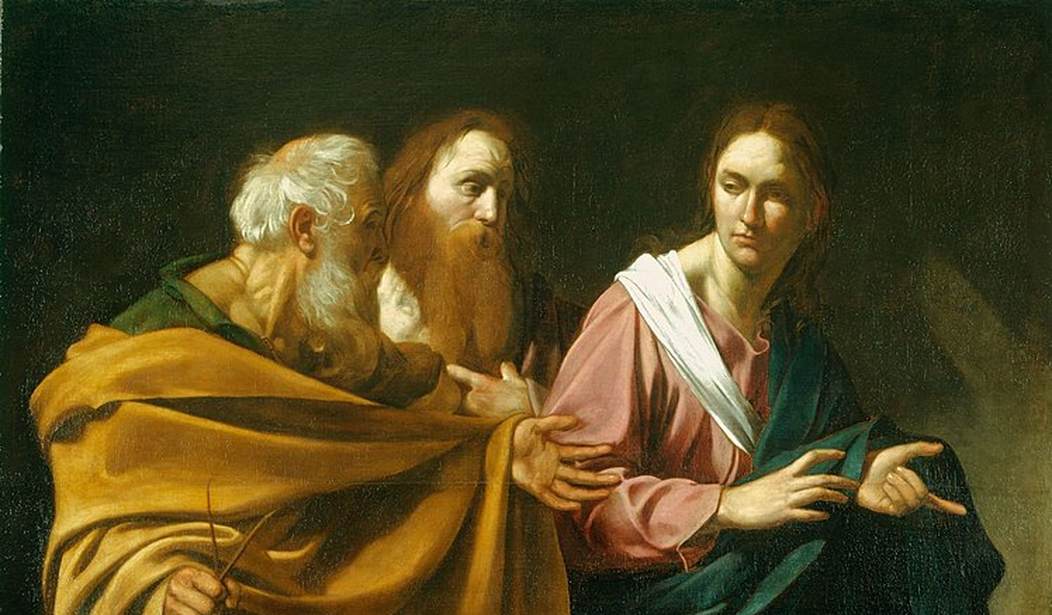This morning’s Gospel reading is John 1:35–42:
John was standing with two of his disciples, and as he watched Jesus walk by, he said, “Behold, the Lamb of God.” The two disciples heard what he said and followed Jesus. Jesus turned and saw them following him and said to them, “What are you looking for?” They said to him, “Rabbi”—which translated means Teacher—, “where are you staying?” He said to them, “Come, and you will see.”
So they went and saw where Jesus was staying, and they stayed with him that day. It was about four in the afternoon. Andrew, the brother of Simon Peter, was one of the two who heard John and followed Jesus. He first found his own brother Simon and told him, “We have found the Messiah” —which is translated Christ—. Then he brought him to Jesus. Jesus looked at him and said, “You are Simon the son of John; you will be called Cephas”—which is translated Peter.
What does it mean to have a “calling,” as opposed to a “vocation”? Both terms are used in both secular and religious terms, usually somewhat interchangeably, There is, however, a distinction in both contexts, a difference on the source of the inspiration.
Let’s start with the secular context. When we discuss “vocation” in the worldly sense, we usually mean “career,” or sometimes even just “job.” The presumed commitment in these cases is primarily economic rather than more broadly philosophical. Vocations in this sense are pursued mainly or even strictly as a duty, a utilitarian necessity for survival at a certain level of living standard.
We often contrast it with our “avocations,” which is where our hearts and interests more passionately lay. We also call these hobbies: fishing, reading, language study, model trains, or any number of fun activities. Avocations bring us joy, where vocations in the secular context bring drudgery, or perhaps at best a tolerable financial arrangement to support a family and fund some of our avocations.
For a fortunate few in the secular context — and I firmly include myself in this category — a vocation can also be a calling. I discovered my calling for writing early in adulthood, although it took me almost two decades to find the channel to which I was called to exercise it. My second job as an adult, after selling high-end men’s clothes for a few years, was as a technical editor at Hughes Aircraft. That job brought me a lot of joy, and my enthusiasm for it sprang from my calling to, well, pedantry if I’m being honest. (You probably don’t meet too many people who might diagram sentences for fun. Now you have.)
I still wanted to do actual writing, but it took 19 years and the creation of the blogosphere to find my real place, and even that was a happy accident. I started my blog as an exercise in daily writing discipline to improve my ability to succeed as a novelist. Instead, I stumbled into this calling, and still haven’t written a published novel.
So is this a vocation or a calling? It’s both, and the difference shouldn’t be that distinct at all. The word “vocation” comes from the Latin vocare, which means “to call.” It didn’t begin to take its present secular definition until the 16th century. A job is a job, and a vocation can be a career, but a true vocation means to be called to something much more profound.
The religious context makes this much more clear. We are called to serve the Lord, usually through the gifts that we receive from the Holy Spirit so as to put them to use for His plan for salvation. Recognizing those gifts and their potential for such use is a way for us to hear His call, which first requires us to be formed to listen and discern the gifts and the call in the first place.
Today we hear of two examples of a more literal call to His service, which demonstrate this point. In our first reading from 1 Samuel, the prophet hears a literal call from the Lord while sleeping near the Ark of the Covenant, but Samuel has not been prepared to receive it. Samuel mistakes it as the voice of Eli, whom he is serving at that time, and twice Eli tells him that he didn’t call Samuel. After the third time, though, Eli realizes that the Lord is calling Samuel.
What does Eli do?
Then Eli understood that the LORD was calling the youth. So he said to Samuel, “Go to sleep, and if you are called, reply, ‘Speak, LORD, for your servant is listening.’” When Samuel went to sleep in his place, the LORD came and revealed his presence, calling out as before, “Samuel, Samuel!” Samuel answered, “Speak, for your servant is listening.”
Eli understands what has happened, but also that Samuel has not yet been formed to discern the call. Eli quickly remedies this and instructs Samuel about who’s calling and how to answer. This is not the end of Samuel’s formation into a prophet, but it allows that formation to begin.
Similarly, Jesus calls the disciples to His side in a similar manner. He comes as an itinerant rabbi preaching the Gospel but touches the hearts of those whom He has chosen for this mission. They have not been completely formed yet either; indeed, they have less formation for their mission than Samuel did, who apprenticed under Eli first. But all of them could discern enough to hear the call, and had hearts open enough to the Lord to follow it. In the case of Jesus’ disciples, they discarded their jobs to enter their vocations in Christ.
That is what today’s Gospel urges us to do as well. We do not need to abandon our homes and our jobs and start walking dusty roads to answer His call, although that may be the call that some do receive. We are first called to answer Him, to open our hearts and our minds through the gifts we have received to hear the call and respond. The most powerful example of this is Mary in her Fiat to the angel when she hears the Lord’s will for her.
We all have that choice within us — to declare that the Lord’s will be done through us and to put aside all that separates us from Him. We will stumble and fall at times as the disciples did, but as long as our faith remains in Him, we can keep hearing the call to return to our true vocations in Christ.
The front-page image is “The Calling of Saints Peter and Andrew” by Caravaggio, c.1603-6. On display at Buckingham Palace. Via Wikimedia Commons.
“Sunday Reflection” is a regular feature, looking at the specific readings used in today’s Mass in Catholic parishes around the world. The reflection represents only my own point of view, intended to help prepare myself for the Lord’s day and perhaps spark a meaningful discussion. Previous Sunday Reflections from the main page can be found here.








Join the conversation as a VIP Member